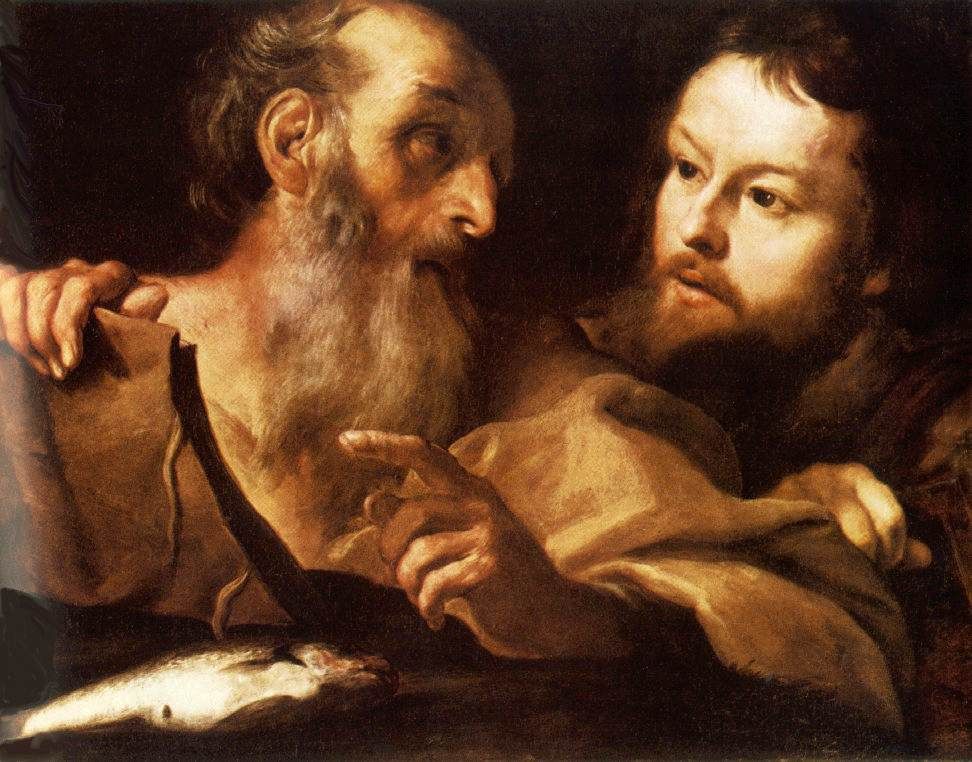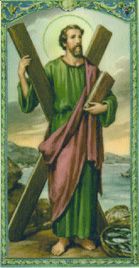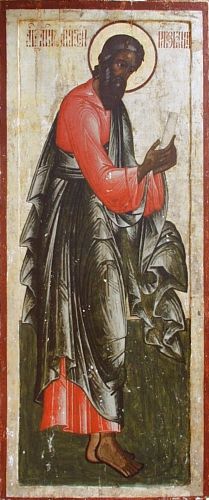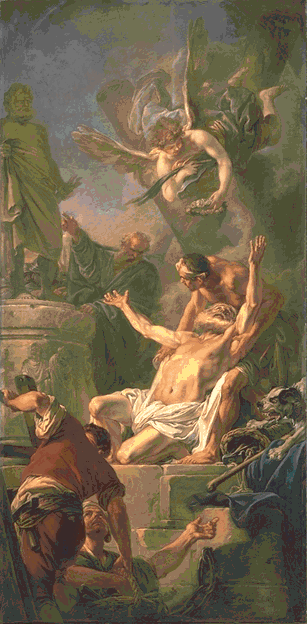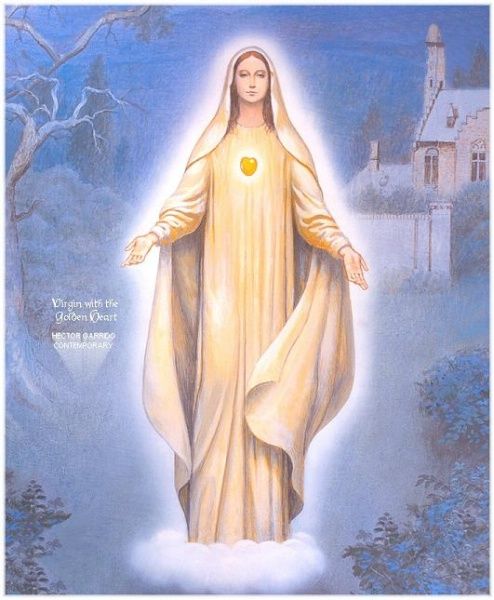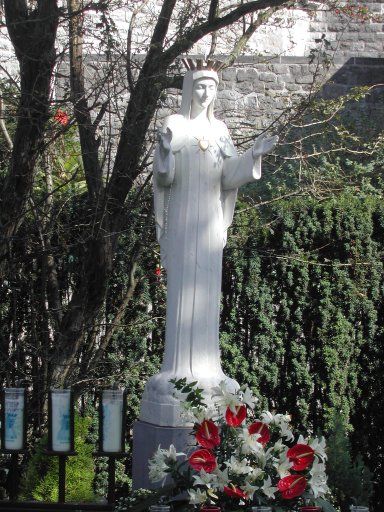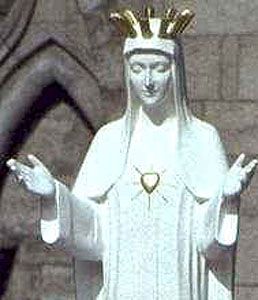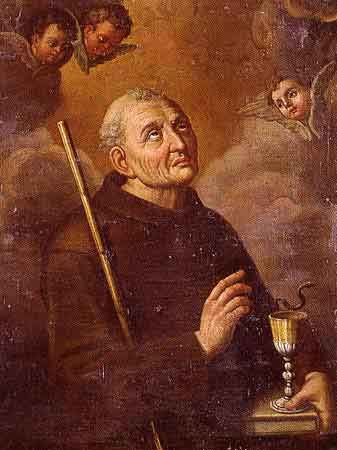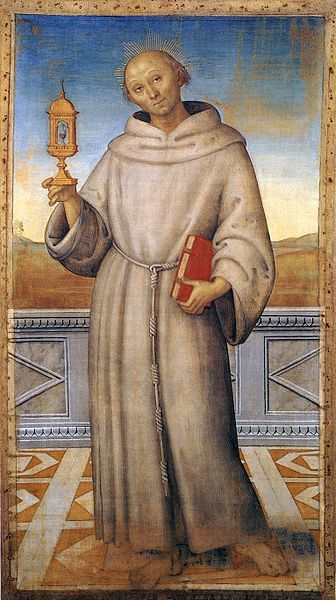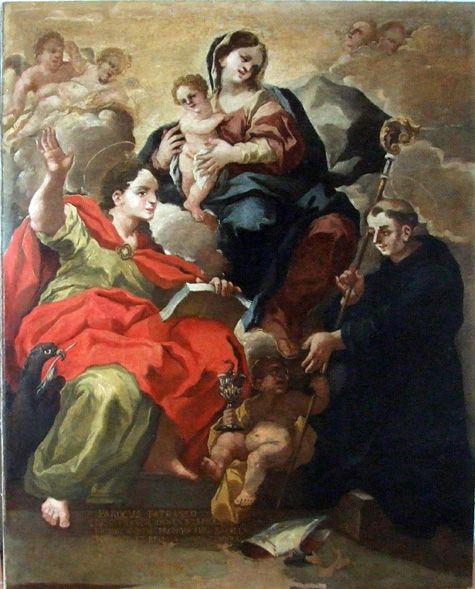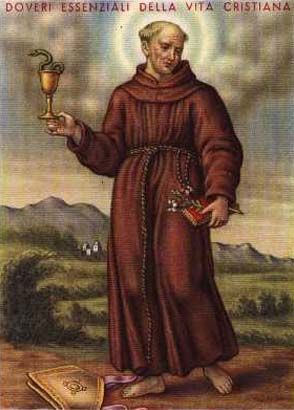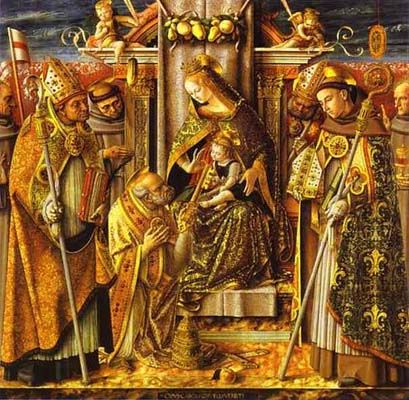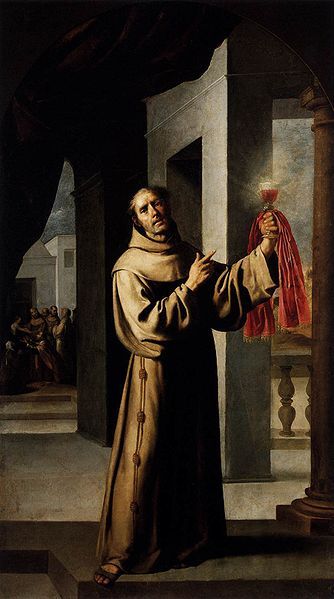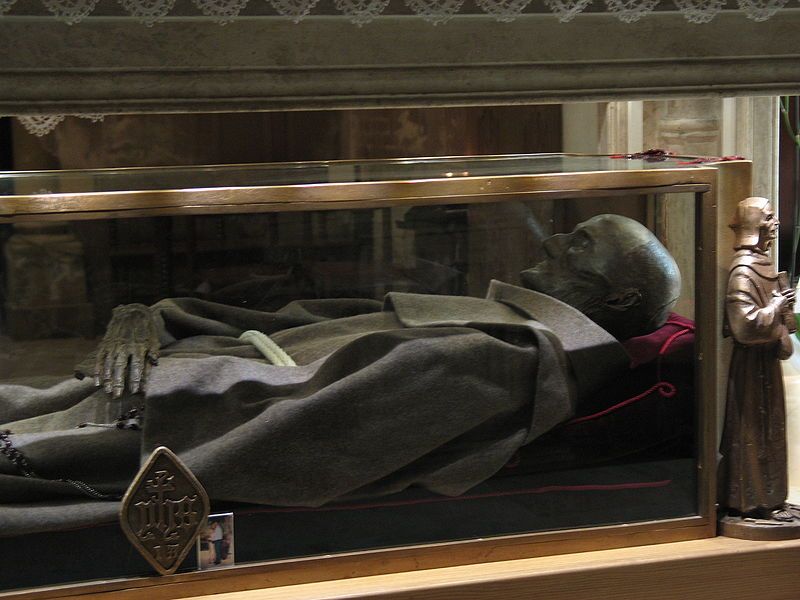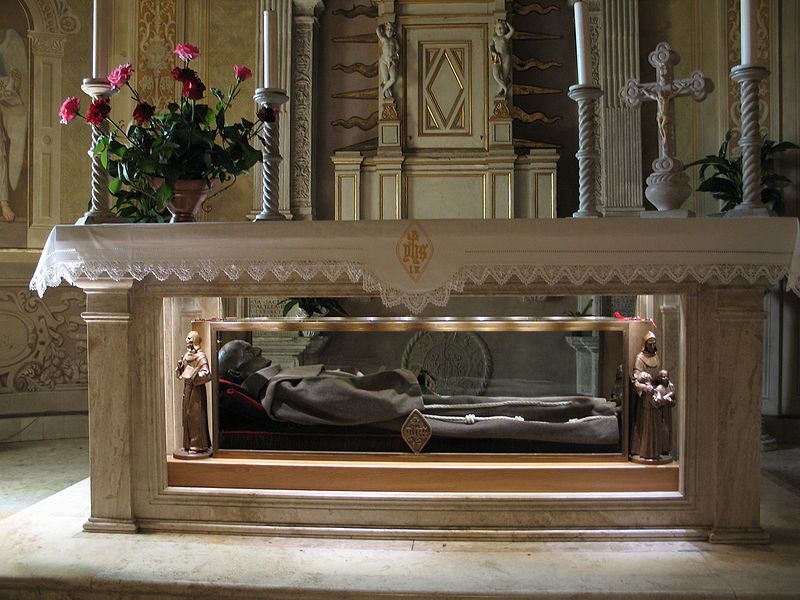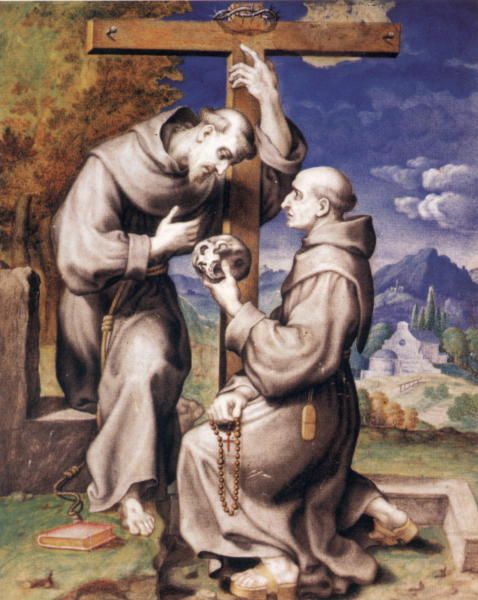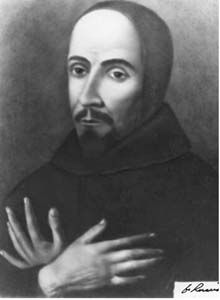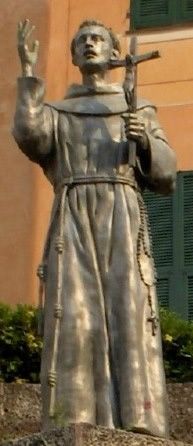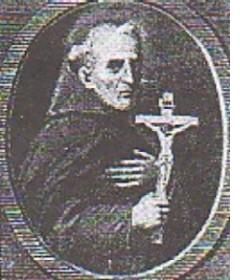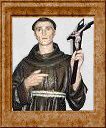Today, November 30, we celebrate the feast day of Saint Andrew (died 60 AD), the Lord’s first apostle, martyr for the faith, and patron saint of Scotland. While John is not featured prominently in the New Testament (although is always listed within the first four disciples, signifying importance), we realize that his faith brought not only his brother, Simon Peter, to follow Jesus, but also many others. Throughout his life, Andrew testified to the love and divinity of Christ, earning himself the martyr’s crown.
Andrew, like his brother Simon Peter, was a fisherman. Early in his life, he became a disciple of Saint John the Baptist, but was quick to understand the implication of Saint John’s naming of Jesus, “Behold the Lamb of God!”
29 The next day John saw Jesus coming toward him and said, “Look, the Lamb of God, who takes away the sin of the world! 30 This is the one I meant when I said, ‘A man who comes after me has surpassed me because he was before me.’ 31 I myself did not know him, but the reason I came baptizing with water was that he might be revealed to Israel.”
32 Then John gave this testimony: “I saw the Spirit come down from heaven as a dove and remain on him. 33 And I myself did not know him, but the one who sent me to baptize with water told me, ‘The man on whom you see the Spirit come down and remain is the one who will baptize with the Holy Spirit.’ 34 I have seen and I testify that this is God’s Chosen One.”
35 The next day John was there again with two of his disciples. 36 When he saw Jesus passing by, he said, “Look, the Lamb of God!”
37 When the two disciples heard him say this, they followed Jesus. 38 Turning around, Jesus saw them following and asked, “What do you want?”
They said, “Rabbi” (which means “Teacher”), “where are you staying?”
39 “Come,” he replied, “and you will see.”
So they went and saw where he was staying, and they spent that day with him. It was about four in the afternoon.
40 Andrew, Simon Peter’s brother, was one of the two who heard what John had said and who had followed Jesus. 41 The first thing Andrew did was to find his brother Simon and tell him, “We have found the Messiah” (that is, the Christ). 42 And he brought him to Jesus.
Jesus looked at him and said, “You are Simon son of John. You will be called Cephas” (which, when translated, is Peter). (John 1: 29-42)
After hearing John’s proclamation, Andrew, without hesitation, left Saint John and began to follow Jesus, recognizing him as master. Jesus knew that Andrew was walking behind him, and turning back, he asked, "what do you seek?" When Andrew answered that he would like to know where Jesus lived, Our Lord replied, "Come and see." Andrew had been only a little time with Jesus when he realized that this was truly the Messiah.
It was later, that while Andrew and his brother were fishing that the Lord called them to the apostolate.
18 As Jesus was walking beside the Sea of Galilee, he saw two brothers, Simon called Peter and his brother Andrew. They were casting a net into the lake, for they were fishermen. 19 “Come, follow me,” Jesus said, “and I will send you out to fish for people.” 20 At once they left their nets and followed him. (Matthew 4: 18-20)
Only two other explicit references to Saint Andrew are contained in the Gospels. The first occurs during the miracle of the loaves and fishes. It was Andrew who reported that a local boy had bread and fish with him:
8 Another of his disciples, Andrew, Simon Peter’s brother, spoke up, 9 “Here is a boy with five small barley loaves and two small fish, but how far will they go among so many?” (John 6: 8-9)
This suggests that Andrew may have been one of the twelve who helped manage the day-to-day tasks of Jesus’ ministry. It was he who was circulating through the crowd of five thousand, attending to the practical needs of the people.
The second of the explicit references to Saint Andrew occurs a few days before the death of Jesus, when Saint Philip was asked by some Greek festival-goers for an audience with Jesus. Philip referred the matter to Andrew, as one of greater authority.
20 Now there were some Greeks among those who went up to worship at the festival. 21 They came to Philip, who was from Bethsaida in Galilee, with a request. “Sir,” they said, “we would like to see Jesus.” 22 Philip went to tell Andrew; Andrew and Philip in turn told Jesus.
23 Jesus replied, “The hour has come for the Son of Man to be glorified. 24 Very truly I tell you, unless a kernel of wheat falls to the ground and dies, it remains only a single seed. But if it dies, it produces many seeds. 25 Anyone who loves their life will lose it, while anyone who hates their life in this world will keep it for eternal life. 26 Whoever serves me must follow me; and where I am, my servant also will be. My Father will honor the one who serves me.
27 “Now my soul is troubled, and what shall I say? ‘Father, save me from this hour’? No, it was for this very reason I came to this hour. 28 Father, glorify your name!” (John 12: 20-28)
These two moments in the life of Saint Andrew demonstrate his closeness to Jesus, one of his trusted circle of disciples. Saint Andrew was present at the Last Supper, beheld the Risen Lord in the Upper Room, witnessed the Ascension, was filled with the Spirit at Pentecost, and continued to preach following the Ascension of Jesus into Heaven. Church legend tells us that Saint Andrew traveled to Greece, Turkey, and Palestine to preach following the death, Resurrection, and Ascension of Jesus.
While the exact location of his preaching is unclear, it is generally agreed upon that he was crucified by order of the Roman Governor Aegeas, at Patrae (in Achaia). Upon seeing the cross that would bear him to his death, Saint Andrew was overwhelmed with love, such was his faith in Christ. As he was bound to the X-shaped cross with rope (rather than nails, to prolong his suffering), he exclaimed:
“O most beautiful cross that was glorified by carrying the body of Christ! Glorious cross, sweetly desired, ardently loved, always sought, and finally prepared for my heart that has so long awaited you. Take me, o cross! Embrace me. Release me from my life among men. Bring me quickly and diligently to the Master. Through you He will receive me, He, Who through you has saved me.”
Saint Andrew remained two days on the cross, suffering, yet preaching to the people. His last words were recorded as follows:
“Lord, eternal King of glory, receive me hanging from the wood of this sweet cross. Thou who art my God, whom I have seen, do not permit them to loosen me from the cross. Do this for me, O Lord, for I know the virtue of Thy Holy Cross.”
The X-shaped decussate cross is now known as Saint Andrew’s Cross. Saint Andrew was buried in Patrae, but eventually his relics were translated to Constantinople, and deposited in the church of the Apostles there, around 357 A.D. When Constantinople fell to French occupation and rule, in the beginning of the thirteenth century, Cardinal Peter of Capua brought the relics to Italy and placed them in the cathedral of Amalfi, where most of them still remain. Saint Regulas also took some of these relics, warned in a dream by an angel, to Scotland with him, explaining Saint Andrew’s association with Scotland.
As is the case with most of the Disciples of Christ, the Gospels tell us very little about the holiness of Saint Andrew. We are left to infer from the words of the New Testament that his life was one of close companionship with Jesus, of service to the Lord and others, and of deep faith and holiness. Jesus called him personally to follow Him, and he gave up all that he had, without hesitation, to do so. We are called to the same life of service, of following Christ, of holiness today. How will we answer the call?
From a homily on the Gospel of John by Saint John Chrysostom:
“After Andrew had stayed with Jesus and had learned much from him, he did not keep this treasure to himself, but hastened to share it with his brother Peter. Notice what Andrew said to him: “We have found the Messiah, that is to say, the Christ.” Notice how his words reveal what he has learned in so short a time. They show the power of the master who has convinced them of this truth. Andrew’s words reveal a soul waiting with the utmost longing for the coming of the Messiah, looking forward to his appearing from heaven, rejoicing when he does appear, and hastening to announce to great an event to others. To support one another in the things of the spirit is the true sign of good will between brothers, loving kinship and sincere affection.”
Prayer to Saint Andrew
O Glorious Saint Andrew, you were the first to recognize and follow the Lamb of God. With your friend Saint John you remained with Jesus for that first day, for your entire life, and now throughout eternity.
As you led your brother Saint Peter to Christ and many others after him, draw us also to him. Teach us to lead others to Christ solely out of love for him and dedication in his service. Help us to learn the lesson of the Cross and to carry our daily crosses without complaint so that they may carry us to Jesus.
Almighty God, who didst give such grace unto thy holy Apostle Saint Andrew, that he readily obeyed the calling of thy Son Jesus Christ, and followed him without delay; Grant unto us all, that we, being called by thy holy word, may forthwith give up ourselves obediently to fulfill thy holy commandments; through Jesus Christ our Lord. Amen.
Year 2: Day 334 of 365
Prayer Intentions: An attitude of holiness. The courage to answer the call of the Lord.
Requested Intentions: Financial security for a mother (M); Health, finances, successful marriage (A); Successful resolution of court case for son (K); Continued sobriety (N); Healing of a chronic health condition (B); Successful employment (A): Peace in a family, recovery of a niece from substance use (L); Blessings on a marriage, healing of a husband (P); For the health and recovery of sisters (B); For a daughter and granddaughter (D); Blessings on overseas employment (M); Healing of mother (L); Successful employment for husband (G); Successful employment, personal fulfillment (C); Health and recovery of ill sister (A); Resolution of legal issues; Grace and protection (E); Successful and meaningful employment (S); Restoration of a marriage (A); Peace and tolerance in a family, support for those with Parkinson’s Disease (M); For the restoration of a daughter’s marriage, end to debt (S); Employment and continued strength (K); Successful examinations for a son (J); Employment and blessings of a child (S); Employment and financial security (F); Successful work placement, continued health (A); Grace and healing for a family (P); Healing of a father (M).
Why pray the Rosary every day for a year?
Each time the Blessed Virgin has appeared-- whether it be to Saint Bernadette Soubirous at Lourdes; to Lucia, Jacinta, and Francisco at Fatima; or to Mariette Beco at Banneux-- she has asserted the importance, saving grace, and power of praying the Holy Rosary on a daily basis. Based upon her words, the Rosary is penance and conversion for sinners, a pathway to peace, an end to war, and a powerful act of faith in Jesus Christ. Pope Paul VI presented the Rosary as a powerful means to reach Christ "not merely with Mary but indeed, insofar as this is possible to us, in the same way as Mary, who is certainly the one who thought about Him more than anyone else has ever done."
To show us how this is done, perhaps no one has been more eloquent than the great Cardinal Newman, who wrote: "The great power of the Rosary consists in the fact that it translates the Creed into Prayer. Of course, the Creed is already in a certain sense a prayer and a great act of homage towards God, but the Rosary brings us to meditate again on the great truth of His life and death, and brings this truth close to our hearts. Even Christians, although they know God, usually fear rather than love Him. The strength of the Rosary lies in the particular manner in which it considers these mysteries, since all our thinking about Christ is intertwined with the thought of His Mother, in the relations between Mother and Son; the Holy Family is presented to us, the home in which God lived His infinite love."
As Mary said at Fatima, "Jesus wants to use you to make Me known and loved. He wishes to establish the devotion to My Immaculate Heart throughout the world. I promise salvation to whoever embraces it; these souls will be dear to God, like flowers put by Me to adorn his throne."

Today, November 29, marks the 80th anniversary of the first appearance of Our Blessed Mother to five children in Beauraing, Belgium in 1932. Over the next three months, ending on January 3, 1933, Mary appeared 33 times at the playground of a convent school the five visionaries, children who belonged to two families: the Voisins (Fernande, 15 years; Gilberte, 13 years; and Albert 11 years) and the Degeimbres (Andree, 14 years, and Gilberte, 9 years old). Identifying herself as "the Immaculate Virgin" and "Mother of God, Queen of Heaven," Our Blessed Mother urged the children to “be good” and to pray for the conversion of sinners. Our Lady of Beauraing is also known as the “Virgin of the Golden Heart,” as her heart seemed to glow with a golden radiance when she appeared to the children.
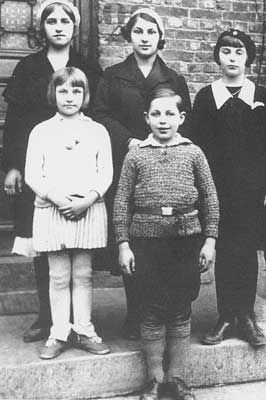 Beauraing, Belgium is a small farming village that lies about sixty miles southeast of Brussels. At the time of the apparitions, the population numbered just 2000. Depression was upon Europe, and unemployment, poverty, and hunger were common. The faithful were falling away from the Church, and anti-Christian political movements were gaining power. The Voisins and the Degeimbres remained practicing Catholics at that time, although only sporadically. However, like many families in Europe at the time, they continued to send one of their children to be educated at a Catholic school. Gilberte was to receive a Catholic education from the Sisters of Christian Doctrine. Each night, Gilberte’s older sister, Fernande (age 15) and younger brother, Albert (age 11) went to meet their sister at the academy after school. This was nothing unusual – they would often walk Gilberte home. On the way to the academy two other girls joined them: Andree Degeimbre (age 14) and Gilberte Degeimbre (age 9). All the children were friends.
Beauraing, Belgium is a small farming village that lies about sixty miles southeast of Brussels. At the time of the apparitions, the population numbered just 2000. Depression was upon Europe, and unemployment, poverty, and hunger were common. The faithful were falling away from the Church, and anti-Christian political movements were gaining power. The Voisins and the Degeimbres remained practicing Catholics at that time, although only sporadically. However, like many families in Europe at the time, they continued to send one of their children to be educated at a Catholic school. Gilberte was to receive a Catholic education from the Sisters of Christian Doctrine. Each night, Gilberte’s older sister, Fernande (age 15) and younger brother, Albert (age 11) went to meet their sister at the academy after school. This was nothing unusual – they would often walk Gilberte home. On the way to the academy two other girls joined them: Andree Degeimbre (age 14) and Gilberte Degeimbre (age 9). All the children were friends. As was their habit, the four ran through the quiet town, playing games and mischievously playing pranks on their neighbors in the dark night. That night, however, something was different. November 29, 1932 would mark their first encounter with “the beautiful lady,” although only from a distance. Upon arriving at the convent, the four children played in the garden, waiting for Gilberte to finish school. In the garden was a small statue of Our Lady of Lourdes. Beyond the garden was the street, and above it a small railroad bridge. As the four were playing, Albert glanced at the bridge, and noticed a lady, dressed all in white, floating as if walking on air above them. As he watched, he clearly could make out the figure bending her knees, walking.
Albert shouted to the others, gaining their attention, and gesturing at the bridge. “It’s the Virgin walking above the bridge!” he exclaimed, his voice noticeably higher and slightly peculiar sounding to the others. They were surprised—even curious—but thought him to be joking. But upon closer examination, they, too, saw her and confirmed “she could be the Blessed Virgin Mary!”
As they were marveling at the appearance of the beautiful lady walking on air, Sister Valeria, Gilberte’s teacher, opened the academy door to allow Gilberte to join her friends. Immediately, she sensed something different about the children. Rather than laughing and joking, they were all quite pale, and somehow appeared anxious. They ran to her, and quickly told her of their vision, pointing to the bridge, and exclaiming their faith. Sister Valeria saw nothing, however, and moved into the garden, turned on lights, and squinted… but she saw no lady on the bridge.
Sister Valeria scolded the children, thinking them playing a prank. Upon turning, however, she discovered that Gilberte—who had been with her, and could not have been involved in this trickery—too, saw the beautiful lady. Gilberte described her as wearing a long, white gown and a long, silk veil that flowed to a small cloud covering her feet—as if walking on air! The beautiful lady gave off a radiant light, which grew in intensity as she approached. Her hands were folded in prayer, and as she neared them, she smiled, but said nothing. Later, all they could say was that her eyes were a deep and magnetic blue, and that she was beautiful.
Sister Valeria, cold and irritated, sent the children away, instructing them not to play pranks, nor to tell anyone the story they had told her. At supper, however, she recounted their story to the Superior Mother of the house, but was instructed to forget it as it was simply the immature story of a group of children. The children, for their part, ran home and immediately told their parents, eager to share their exciting news. Of course, they were not believed, and instead, were scolded for lying. Their friends teased them the next day, and several were taken to see the family physician, as they were concerned for their mental health.
Over the next several nights, however, the children would see Our Blessed Mother on the bridge again, always walking toward them, never speaking. After repeatedly telling their parents, they were encouraged to ask the Lady her name. This they would courageously do on December 2, the evening of the next phase of apparitions.
Our Lady would return to the children thirty-three times over the next 10 weeks, bringing with her a message of peace, penance, and prayer for the conversion of sinners. Our Blessed Mother graced us with her golden heart, encouraging us to sacrifice ourselves for the Lord, and for the salvation of the world. We pray today, on the anniversary of the first apparition, for conversion of sinners, peace, and salvation.
Our Lady of Beauraing, Immaculate Virgin, bring to Jesus, your Son, all the intentions that we entrust to you today. Mother of the Golden Heart, reflection of the Father's tenderness, look upon the men and women of our time with love and fill them with the joy of your presence. You, who promised to convert sinners, help us discover the infinite mercy of our God. Awaken within us the grace of conversion so that our lives may be a reflection of that mercy. Make every moment of our existence "a yes" to the question you ask today: "Do you love my Son? Do you love me?" Then the kingdom of Jesus will come to the world. Amen.
Year 2: Day 333 of 365
Prayer Intentions: Conversion; Peace; Salvation.
Requested Intentions: Financial security for a mother (M); Health, finances, successful marriage (A); Successful resolution of court case for son (K); Continued sobriety (N); Healing of a chronic health condition (B); Successful employment (A): Peace in a family, recovery of a niece from substance use (L); Blessings on a marriage, healing of a husband (P); For the health and recovery of sisters (B); For a daughter and granddaughter (D); Blessings on overseas employment (M); Healing of mother (L); Successful employment for husband (G); Successful employment, personal fulfillment (C); Health and recovery of ill sister (A); Resolution of legal issues; Grace and protection (E); Successful and meaningful employment (S); Restoration of a marriage (A); Peace and tolerance in a family, support for those with Parkinson’s Disease (M); For the restoration of a daughter’s marriage, end to debt (S); Employment and continued strength (K); Successful examinations for a son (J); Employment and blessings of a child (S); Employment and financial security (F); Successful work placement, continued health (A); Grace and healing for a family (P); Healing of a father (M).
"Beloved and most holy word of God! You enlighten the hearts of the faithful, you satisfy the hungry, console the afflicted; you make the souls of all productive of good and cause all virtues to blossom; you snatch souls from the devil’s jaw; you make the wretched holy, and men of earth citizens of heaven!"
Today, November 28, we celebrate the feast day of Saint James of the Marches (Giacomo della Marca, 1391-1476), Franciscan friar, missionary, preacher, and opponent of heresy. The life of Saint James is remarkable for his commitment to defense of Church doctrine, his tireless preaching and conversions of sinners, miracle working, and austerity.
James Gangala was born into an extremely poor family at Montebrandone (in the Marche of Ancona), in central Italy along the Adriatic Sea. Drawn to the Lord, he began his studies at Offida under the guidance of his uncle, a priest, who soon afterwards put him to school at Ascoli. At the University of Perugia he took the degree of Doctor in Civil Law. After a short stay at Florence as tutor in a noble family, and as judge of sorcerers, James was received into the Order of the Friars Minor, the Franciscan order at Assisi, at the age of 25. Studying under Saint Bernardino of Siena, James was widely recognized for his oratory, delivering both forceful and effective sermons, and converting thousands of souls. Ordained at age twenty-nine, James was sent on mission with Saint John Capistrano, traveling throughout Italy, German, Bohemia, Poland, and Hungary.
Noting his orthodoxy, Pope Saint Martin V appointed him inquisitor to root out heretical sects that were growing in power throughout Italy. He continued his travels, preaching, working against heresy, and attempting to reconcile various branches of the Franciscan Order. He attended the Council of Florence in 1438, working diligently to reconcile the Eastern and Latin Churches, with little success.
Elected bishop of Milan, James humbly declined the position, preferring to continue his itinerant lifestyle, traveling, preaching, and confirming the truth of Church doctrine. Saint James preached every day for 40 years, beginning on the date of his ordination, and ending on the date of his death. He preached a message of penance, which he also put into practice. James slept only three hours each evening, and fasted nine months of the year. Thin, dressed always in the same tattered brown robe, and susceptible to illness, Saint James ate little, giving all he had to the needy. As he grew older, and his health began to observably fail, Pope Martin V ordered him to eat regularly, as a public service, so that he could continue his ministry. Charitable, Saint James instituted several montes pietatis, (literally, “mountains of money”), which provided low-interest loans to all who needed them.
Saint James founded several monasteries in Bohemia, Hungary, and Austria. Especially devoted to the Precious Blood of Jesus, he, himself, was brought up on heresy charges during the Dominican Inquisition in 1462. The Pope intervened, ordering the case put on permanent hold, with no decision ever rendered on his statements. However, during the course of the inquisition, James was the victim of attempted assassination twice, both times in the form of a poisoned chalice (as he is frequently depicted in art).
Saint James spent the last three years of his life at Naples, and was buried there in the Franciscan church of San Maria la Nuova, where his body is still to be seen, preserved beneath the alter. Numerous miracles have been reported through his intercession, both while he lived and subsequent to his death.
On today, the feast of Saint James of the Marches, we pray for the fortitude, steadfastness, and endurance that this holy man displayed each day of his life. Saint James, pray for us!
A Prayer for Fortitude
O Holy Spirit who descended upon the twelve as they stood in anxiety, come unto me in my endeavors. Banish from my heart all timidity and false pride; strengthen my soul to avoid all sin, to practice virtue, and to prefer ridicule to the denial of my Lord and Savior Jesus Christ. Let not the goodness of purity, obedience and charity be obscured in the face of adversity. Instill in me the virtue of Fortitude so that I may courageously profess and practice my holy Catholic faith. Open my eyes, O Holy Spirit, that I may recognize my state in life. Give me the confidence to embrace it and the strength to live it as a son of God. I pray that Your guidance, protection and consolation may be with me now and throughout my life. Amen.
Year 2: Day 332 of 365
Prayer Intentions: Fortitude, Steadfastness, Endurance.
Requested Intentions: Financial security for a mother (M); Health, finances, successful marriage (A); Successful resolution of court case for son (K); Continued sobriety (N); Healing of a chronic health condition (B); Successful employment (A): Peace in a family, recovery of a niece from substance use (L); Blessings on a marriage, healing of a husband (P); For the health and recovery of sisters (B); For a daughter and granddaughter (D); Blessings on overseas employment (M); Healing of mother (L); Successful employment for husband (G); Successful employment, personal fulfillment (C); Health and recovery of ill sister (A); Resolution of legal issues; Grace and protection (E); Successful and meaningful employment (S); Restoration of a marriage (A); Peace and tolerance in a family, support for those with Parkinson’s Disease (M); For the restoration of a daughter’s marriage, end to debt (S); Employment and continued strength (K); Successful examinations for a son (J); Employment and blessings of a child (S); Employment and financial security (F); Successful work placement, continued health (A); Grace and healing for a family (P); Healing of a father (M).
Today, November 28, we celebrate the feast day of Saint James of the Marches (Giacomo della Marca, 1391-1476), Franciscan friar, missionary, preacher, and opponent of heresy. The life of Saint James is remarkable for his commitment to defense of Church doctrine, his tireless preaching and conversions of sinners, miracle working, and austerity.
James Gangala was born into an extremely poor family at Montebrandone (in the Marche of Ancona), in central Italy along the Adriatic Sea. Drawn to the Lord, he began his studies at Offida under the guidance of his uncle, a priest, who soon afterwards put him to school at Ascoli. At the University of Perugia he took the degree of Doctor in Civil Law. After a short stay at Florence as tutor in a noble family, and as judge of sorcerers, James was received into the Order of the Friars Minor, the Franciscan order at Assisi, at the age of 25. Studying under Saint Bernardino of Siena, James was widely recognized for his oratory, delivering both forceful and effective sermons, and converting thousands of souls. Ordained at age twenty-nine, James was sent on mission with Saint John Capistrano, traveling throughout Italy, German, Bohemia, Poland, and Hungary.
Noting his orthodoxy, Pope Saint Martin V appointed him inquisitor to root out heretical sects that were growing in power throughout Italy. He continued his travels, preaching, working against heresy, and attempting to reconcile various branches of the Franciscan Order. He attended the Council of Florence in 1438, working diligently to reconcile the Eastern and Latin Churches, with little success.
Elected bishop of Milan, James humbly declined the position, preferring to continue his itinerant lifestyle, traveling, preaching, and confirming the truth of Church doctrine. Saint James preached every day for 40 years, beginning on the date of his ordination, and ending on the date of his death. He preached a message of penance, which he also put into practice. James slept only three hours each evening, and fasted nine months of the year. Thin, dressed always in the same tattered brown robe, and susceptible to illness, Saint James ate little, giving all he had to the needy. As he grew older, and his health began to observably fail, Pope Martin V ordered him to eat regularly, as a public service, so that he could continue his ministry. Charitable, Saint James instituted several montes pietatis, (literally, “mountains of money”), which provided low-interest loans to all who needed them.
Saint James founded several monasteries in Bohemia, Hungary, and Austria. Especially devoted to the Precious Blood of Jesus, he, himself, was brought up on heresy charges during the Dominican Inquisition in 1462. The Pope intervened, ordering the case put on permanent hold, with no decision ever rendered on his statements. However, during the course of the inquisition, James was the victim of attempted assassination twice, both times in the form of a poisoned chalice (as he is frequently depicted in art).
Saint James spent the last three years of his life at Naples, and was buried there in the Franciscan church of San Maria la Nuova, where his body is still to be seen, preserved beneath the alter. Numerous miracles have been reported through his intercession, both while he lived and subsequent to his death.
On today, the feast of Saint James of the Marches, we pray for the fortitude, steadfastness, and endurance that this holy man displayed each day of his life. Saint James, pray for us!
A Prayer for Fortitude
O Holy Spirit who descended upon the twelve as they stood in anxiety, come unto me in my endeavors. Banish from my heart all timidity and false pride; strengthen my soul to avoid all sin, to practice virtue, and to prefer ridicule to the denial of my Lord and Savior Jesus Christ. Let not the goodness of purity, obedience and charity be obscured in the face of adversity. Instill in me the virtue of Fortitude so that I may courageously profess and practice my holy Catholic faith. Open my eyes, O Holy Spirit, that I may recognize my state in life. Give me the confidence to embrace it and the strength to live it as a son of God. I pray that Your guidance, protection and consolation may be with me now and throughout my life. Amen.
Year 2: Day 332 of 365
Prayer Intentions: Fortitude, Steadfastness, Endurance.
Requested Intentions: Financial security for a mother (M); Health, finances, successful marriage (A); Successful resolution of court case for son (K); Continued sobriety (N); Healing of a chronic health condition (B); Successful employment (A): Peace in a family, recovery of a niece from substance use (L); Blessings on a marriage, healing of a husband (P); For the health and recovery of sisters (B); For a daughter and granddaughter (D); Blessings on overseas employment (M); Healing of mother (L); Successful employment for husband (G); Successful employment, personal fulfillment (C); Health and recovery of ill sister (A); Resolution of legal issues; Grace and protection (E); Successful and meaningful employment (S); Restoration of a marriage (A); Peace and tolerance in a family, support for those with Parkinson’s Disease (M); For the restoration of a daughter’s marriage, end to debt (S); Employment and continued strength (K); Successful examinations for a son (J); Employment and blessings of a child (S); Employment and financial security (F); Successful work placement, continued health (A); Grace and healing for a family (P); Healing of a father (M).
“Francesco made the love taught us by Christ the fundamental characteristic of his existence, the basic criterion of his thought and activity, the supreme summit of his aspirations.” (Pope John Paul II)
"In his preaching he spoke in a familiar way, filled as he was with the love of God and neighbor; fired by the Spirit, he made use of the words and deed of Holy Scripture, stirring his listeners and moving them to do penance.” (a witness to his preaching, recorded in the investigation for his canonization)
Today, November 27, we celebrate the feast day of Saint Francesco Antonio Fasani (also known as Saint Francis Anthony, 1681-1742), Franciscan mystic, teacher, confessor, and preacher. Saint Francesco lived a humble life, remaining open to the call of the Lord, and serving Him by serving those he encountered every day.
Francesco was born in Lucera (Southeast Italy) and grew up a pious child. He entered the Conventional Franciscan order at the young age of 14, taking the name Francis. Ordained ten years later. Initially, he was appointed to teach philosophy to the younger friars, served as the guardian of his friary, became the provincial of the order, master of novices, and finally pastor in his hometown. There he lived for 35 years, an unwavering witness to the Gospel life and a zealous pastor.
Regardless of what ministry he was undertaking, Francesco approached his task devoutly, with his whole heart open to God. He was loving and penitential, generous to a fault, charitable, and gentle. Francesco was much sought-after as a confessor and preacher. He further was a gifted alms-gatherer, successfully obtaining from wealthy benefactors the much-needed money and goods for the suffering poor. He was known to all, by all, as “Padre Maestro,” Father Master.
From the Vatican biography of Saint Francesco:
“The spiritual life of Fr. Fasani was characterized by those virtues that made him like his Seraphic Father St. Francis. In fact, it was said in Lucera: "Whoever wants to see how St. Francis looked while he was alive should come to see Padre Maestro." In imitation of St. Francis he built his religious life on the basis of a generous participation in the mysteries of Christ through the most faithful practice of the evangelical counsels, which he considered to be a radical expression of perfect charity. In his constant prayers, inflamed with seraphic love, he called out to God, saying to Him: "O Highest Love, Immense Love, Eternal Love, Infinite Love."
His fervent devotion to the Immaculate Mother of the Lord was nourished by his intense dedication to knowing ever better "who Mary is" and making her known to others, while at the same time knowing and making known the maternal role entrusted to her in the history of salvation with faith and love.”
As a worthy ministry of "the one who uninterruptedly exercises his priestly mission for us in the Liturgy through the Spirit" (PO, 5), Fr. Fasani dedicated himself with zeal-especially the administration of the sacrament of Penance and the celebration of the Holy Eucharist. "He heard the confession of every type of person," asserted a witness, "with the greatest patience and kindness on his face". He was charitable and welcoming to all, giving as his reason the hope of being able one day to say to the Lord: "I was indulgent, I don't deny it; but it was You who taught me to be so."
The most holy Eucharist was the summit of his religious life and wholly represented the goal toward which be ordered his entire priestly ministry. In fact, he always considered the Eucharist "the source and summit of evangelization," and that the faithful were "fully incorporated into the Body of Christ through the Eucharist" (PO, 5). A fervent minister of the Eucharist, Fr. Fasani celebrated the sacrifice of the Mass with an intense ardor that lifted and nourished his spirit while at the same time it edified all who were present. In his preaching he inculcated in the faithful the love of the Eucharist, promoting even daily communion.”
Saint Francesco died peacefully, calling out to the Lord, at the age of sixty one. At his death in Lucera, children ran through the streets and cried out, "The saint is dead! The saint is dead!" Francesco was canonized in 1986.
Year 2: Day 329 of 365
Prayer Intentions: Humble lives devoted wholly to the Lord.
Requested Intentions: Financial security for a mother (M); Health, finances, successful marriage (A); Successful resolution of court case for son (K); Continued sobriety (N); Healing of a chronic health condition (B); Successful employment (A): Peace in a family, recovery of a niece from substance use (L); Blessings on a marriage, healing of a husband (P); For the health and recovery of sisters (B); For a daughter and granddaughter (D); Blessings on overseas employment (M); Healing of mother (L); Successful employment for husband (G); Successful employment, personal fulfillment (C); Health and recovery of ill sister (A); Resolution of legal issues; Grace and protection (E); Successful and meaningful employment (S); Restoration of a marriage (A); Peace and tolerance in a family, support for those with Parkinson’s Disease (M); For the restoration of a daughter’s marriage, end to debt (S); Employment and continued strength (K); Successful examinations for a son (J); Employment and blessings of a child (S); Employment and financial security (F); Successful work placement, continued health (A); Grace and healing for a family (P); Healing of a father (M).
"In his preaching he spoke in a familiar way, filled as he was with the love of God and neighbor; fired by the Spirit, he made use of the words and deed of Holy Scripture, stirring his listeners and moving them to do penance.” (a witness to his preaching, recorded in the investigation for his canonization)
Today, November 27, we celebrate the feast day of Saint Francesco Antonio Fasani (also known as Saint Francis Anthony, 1681-1742), Franciscan mystic, teacher, confessor, and preacher. Saint Francesco lived a humble life, remaining open to the call of the Lord, and serving Him by serving those he encountered every day.
Francesco was born in Lucera (Southeast Italy) and grew up a pious child. He entered the Conventional Franciscan order at the young age of 14, taking the name Francis. Ordained ten years later. Initially, he was appointed to teach philosophy to the younger friars, served as the guardian of his friary, became the provincial of the order, master of novices, and finally pastor in his hometown. There he lived for 35 years, an unwavering witness to the Gospel life and a zealous pastor.
Regardless of what ministry he was undertaking, Francesco approached his task devoutly, with his whole heart open to God. He was loving and penitential, generous to a fault, charitable, and gentle. Francesco was much sought-after as a confessor and preacher. He further was a gifted alms-gatherer, successfully obtaining from wealthy benefactors the much-needed money and goods for the suffering poor. He was known to all, by all, as “Padre Maestro,” Father Master.
From the Vatican biography of Saint Francesco:
“The spiritual life of Fr. Fasani was characterized by those virtues that made him like his Seraphic Father St. Francis. In fact, it was said in Lucera: "Whoever wants to see how St. Francis looked while he was alive should come to see Padre Maestro." In imitation of St. Francis he built his religious life on the basis of a generous participation in the mysteries of Christ through the most faithful practice of the evangelical counsels, which he considered to be a radical expression of perfect charity. In his constant prayers, inflamed with seraphic love, he called out to God, saying to Him: "O Highest Love, Immense Love, Eternal Love, Infinite Love."
His fervent devotion to the Immaculate Mother of the Lord was nourished by his intense dedication to knowing ever better "who Mary is" and making her known to others, while at the same time knowing and making known the maternal role entrusted to her in the history of salvation with faith and love.”
As a worthy ministry of "the one who uninterruptedly exercises his priestly mission for us in the Liturgy through the Spirit" (PO, 5), Fr. Fasani dedicated himself with zeal-especially the administration of the sacrament of Penance and the celebration of the Holy Eucharist. "He heard the confession of every type of person," asserted a witness, "with the greatest patience and kindness on his face". He was charitable and welcoming to all, giving as his reason the hope of being able one day to say to the Lord: "I was indulgent, I don't deny it; but it was You who taught me to be so."
The most holy Eucharist was the summit of his religious life and wholly represented the goal toward which be ordered his entire priestly ministry. In fact, he always considered the Eucharist "the source and summit of evangelization," and that the faithful were "fully incorporated into the Body of Christ through the Eucharist" (PO, 5). A fervent minister of the Eucharist, Fr. Fasani celebrated the sacrifice of the Mass with an intense ardor that lifted and nourished his spirit while at the same time it edified all who were present. In his preaching he inculcated in the faithful the love of the Eucharist, promoting even daily communion.”
Saint Francesco died peacefully, calling out to the Lord, at the age of sixty one. At his death in Lucera, children ran through the streets and cried out, "The saint is dead! The saint is dead!" Francesco was canonized in 1986.
Year 2: Day 329 of 365
Prayer Intentions: Humble lives devoted wholly to the Lord.
Requested Intentions: Financial security for a mother (M); Health, finances, successful marriage (A); Successful resolution of court case for son (K); Continued sobriety (N); Healing of a chronic health condition (B); Successful employment (A): Peace in a family, recovery of a niece from substance use (L); Blessings on a marriage, healing of a husband (P); For the health and recovery of sisters (B); For a daughter and granddaughter (D); Blessings on overseas employment (M); Healing of mother (L); Successful employment for husband (G); Successful employment, personal fulfillment (C); Health and recovery of ill sister (A); Resolution of legal issues; Grace and protection (E); Successful and meaningful employment (S); Restoration of a marriage (A); Peace and tolerance in a family, support for those with Parkinson’s Disease (M); For the restoration of a daughter’s marriage, end to debt (S); Employment and continued strength (K); Successful examinations for a son (J); Employment and blessings of a child (S); Employment and financial security (F); Successful work placement, continued health (A); Grace and healing for a family (P); Healing of a father (M).
"If the Lord at the moment of my death reproves me for being too kind to sinners, I will answer, 'My dear Jesus, if it is a fault to be too kind to sinners, it is a fault I learned from you, for you never scolded anyone who came to you seeking mercy.’”
Today, November 26, we celebrate the feast day of Saint Leonard of Port Maurice (1676-1751), a Franciscan friar, preacher, and writer. Leonard, called "the great missionary of the 18th century" by Saint Alphonsus Liguori, wished to go to the foreign missions of China, but like other servants of the Lord, was called to serve in another manner. Saint Leonard’s devotion to the Stations of the Cross, and his fierce sermons on the salvation of souls converted thousands as he preached in the great town squares across Europe. He was one of the greatest missionaries of the Church.
Leonard (named Paul Jerome Casanova at birth) was born at Port Maurice, a seaport near Genoa, Italy. Leonard’s father was a pious sea captain, and paid so much attention to the spiritual education of his children that three of his sons entered the Franciscan Order (including Leonard), and his only daughter became a nun.
At the young age of thirteen, Leonard left home in Port Maurice and traveled to Rome to begin his studies at the Roman college. There, he was recognized for his piety, diligence, and charitable works, and was compared to Saint Aloysius who had attended the same school. Having planned on becoming a physician, Leonard soon was called by the Lord in another direction. One day, while visiting a church connected to the Franciscan convent of Saint Bonaventure, he was moved by the words of the choir: "Converte nos Deus, salutaris noster!” – “Convert us, O God, our salvation!” Hearing this as a call from the Lord, Leonard determined to enter the Franciscan Order and spend his life in service.
Leonard entered the Riformella, a branch of the Franciscans of the Strict Observance, taking the name Brother Leonard at the age of twenty-one. He became the model Franciscan and the pride of the order. His exact observance of the rule of Saint Francis was admirable. He similarly espoused the characteristics of the founder of the order, evidenced by his fervor at prayer, his burning love of Jesus and Mary, his rigorous penance, his humility, and his tireless charity toward his neighbor. Saint Leonard further scourged himself mercilessly for the salvation of sinners. While Leonard wanted nothing more that to travel overseas—specifically to China—to preach the Gospel, he was of poor health, having suffered earlier in his studies from Consumption. His miraculous survival of the illness is attributed to the intercession of the Blessed Virgin.
Unable to travel to China, Saint Leonard devoted himself to parish missions. His missions lasted 15 to 18 days, and he often stayed an additional week to hear confessions. He said: "I believe that in those days the real and greatest fruit of the mission is gathered. As much good is done in these days as during the mission." Leonard spent twenty-four years as a missionary, traveling throughout Italy and Corsica. He became known as one of the greatest missioners in the history of the Church. He preached to thousands in the open square of every city and town where the churches could not hold his listeners. So brilliant and holy was his eloquence that once when he gave a two weeks' mission in Rome, the Pope and College of Cardinals came to hear him. Through his preaching, even the most hardened of hearts was converted to Jesus Christ.
Saint Leonard also concerned himself with the care of the Order and his fellow brothers. He oversaw the building of a retreat house that the Franciscans used to prepare for missionary work, and founded several pious fraternities in Rome, including that of the Sacred Heart.
Saint Leonard was devoted to spreading the adoration of the Blessed Sacrament, the veneration of the Sacred Heart of Jesus, and the Immaculate Conception of the Blessed Virgin (the doctrine had not yet been established). He was in no small way responsible for the definition of the Immaculate Conception made a little more than a hundred years after his death. He also wrote the Divine Praises, which are said at the end of Benediction. But Saint Leonard's most famous work was his devotion to the Stations of the Cross. He established the Way of the Cross in over 500 places, including the Coliseum in Rome.
Pope Benedict XIV held Saint Leonard in high esteem, asking him to promise to die only in Rome, and no other city. Upon returning from a mission, Father Leonard kept his promise, dying peacefully at the convent of Saint Bonaventure. Numerous miracles were reported at his tomb side following his death. He is regarded as the patron saint of parish missions.
Saint Leonard preached with the fire of the Lord. Not only to withdraw from confrontation, his sermons detailed what waited for those who did not lead virtuous lives, wrapped in the redeeming love of Christ. His words have saved and will save countless souls till the end of until. The Church, in the prayer of the Divine Office, Sixth Lesson, says of Saint Leonard's heavenly eloquence: “Upon hearing him, even hearts of iron and brass were powerfully inclined to penance, by reason of the astonishing effectiveness of the sermon and the preacher's burning zeal. And in the liturgical prayer we ask of the Lord, Give the power to bend the hearts of hardened sinners by the works of preaching.” Today, like every day, we, too, are called to conversion. Saint Leonard of Port Maurice, pray for us!
Selected Quotations of Saint Leonard of Port Maurice
On Our Blessed Mother: “She has had a decisive influence on our lives. Each of us has his own experience. Looking back we see her intervention behind every problem, driving us forward and with the definitive push making us begin anew. Whenever I get down to thinking about the numerous graces I have received from Mary, I feel like one of those Marian Shrines on the walls of which, covered with 'offerings', there is inscribed only: 'Through grace received from Mary'. In this way, it seems that I am written all over: Through grace received from Mary'.
Every good thought, every good act of will, every movement of my heart: 'Through grace received from Mary'.”
On the Power of Holy Mass:
"The principal excellence of the most Holy Sacrifice of the Mass consists in being essentially, and in the very highest degree, identical with that which was offered on the Cross of Calvary: with this sole difference that the sacrifice on the Cross was bloody, and made once for all, and did on that one occasion satisfy fully for all the sins of the world; while the sacrifice of the altar is an unbloody sacrifice, which can be repeated an infinite number of times, and was instituted in order to apply in detail that universal ransom which Jesus paid for us on Calvary."
"I believe that were it not for the Holy Mass, as this moment the world would be in the abyss, unable to bear up under the mighty load of its iniquities Mass is the potent prop that hold the world on its base."
"What graces, gifts and virtues the Holy Mass calls down ... repentance for sin ... victory over temptation ... holy inspirations which dispositions to shake off tepidity ... the grace of final perseverance, upon which depends our salvation ... temporal blessings, such as peace, abundance and health ..."
Almighty and merciful God, You made Saint Leonard an illustrious herald of the mystery of the cross. Through his prayers may we comes to know the riches of the cross on earth and attain to its reward in heaven. Amen.
Year 2: Day 329 of 365
Prayer Intentions: True conversion.
Requested Intentions: Financial security for a mother (M); Health, finances, successful marriage (A); Successful resolution of court case for son (K); Continued sobriety (N); Healing of a chronic health condition (B); Successful employment (A): Peace in a family, recovery of a niece from substance use (L); Blessings on a marriage, healing of a husband (P); For the health and recovery of sisters (B); For a daughter and granddaughter (D); Blessings on overseas employment (M); Healing of mother (L); Successful employment for husband (G); Successful employment, personal fulfillment (C); Health and recovery of ill sister (A); Resolution of legal issues; Grace and protection (E); Successful and meaningful employment (S); Restoration of a marriage (A); Peace and tolerance in a family, support for those with Parkinson’s Disease (M); For the restoration of a daughter’s marriage, end to debt (S); Employment and continued strength (K); Successful examinations for a son (J); Employment and blessings of a child (S); Employment and financial security (F); Successful work placement, continued health (A); Grace and healing for a family (P); Healing of a father (M).
Today, November 26, we celebrate the feast day of Saint Leonard of Port Maurice (1676-1751), a Franciscan friar, preacher, and writer. Leonard, called "the great missionary of the 18th century" by Saint Alphonsus Liguori, wished to go to the foreign missions of China, but like other servants of the Lord, was called to serve in another manner. Saint Leonard’s devotion to the Stations of the Cross, and his fierce sermons on the salvation of souls converted thousands as he preached in the great town squares across Europe. He was one of the greatest missionaries of the Church.
Leonard (named Paul Jerome Casanova at birth) was born at Port Maurice, a seaport near Genoa, Italy. Leonard’s father was a pious sea captain, and paid so much attention to the spiritual education of his children that three of his sons entered the Franciscan Order (including Leonard), and his only daughter became a nun.
At the young age of thirteen, Leonard left home in Port Maurice and traveled to Rome to begin his studies at the Roman college. There, he was recognized for his piety, diligence, and charitable works, and was compared to Saint Aloysius who had attended the same school. Having planned on becoming a physician, Leonard soon was called by the Lord in another direction. One day, while visiting a church connected to the Franciscan convent of Saint Bonaventure, he was moved by the words of the choir: "Converte nos Deus, salutaris noster!” – “Convert us, O God, our salvation!” Hearing this as a call from the Lord, Leonard determined to enter the Franciscan Order and spend his life in service.
Leonard entered the Riformella, a branch of the Franciscans of the Strict Observance, taking the name Brother Leonard at the age of twenty-one. He became the model Franciscan and the pride of the order. His exact observance of the rule of Saint Francis was admirable. He similarly espoused the characteristics of the founder of the order, evidenced by his fervor at prayer, his burning love of Jesus and Mary, his rigorous penance, his humility, and his tireless charity toward his neighbor. Saint Leonard further scourged himself mercilessly for the salvation of sinners. While Leonard wanted nothing more that to travel overseas—specifically to China—to preach the Gospel, he was of poor health, having suffered earlier in his studies from Consumption. His miraculous survival of the illness is attributed to the intercession of the Blessed Virgin.
Unable to travel to China, Saint Leonard devoted himself to parish missions. His missions lasted 15 to 18 days, and he often stayed an additional week to hear confessions. He said: "I believe that in those days the real and greatest fruit of the mission is gathered. As much good is done in these days as during the mission." Leonard spent twenty-four years as a missionary, traveling throughout Italy and Corsica. He became known as one of the greatest missioners in the history of the Church. He preached to thousands in the open square of every city and town where the churches could not hold his listeners. So brilliant and holy was his eloquence that once when he gave a two weeks' mission in Rome, the Pope and College of Cardinals came to hear him. Through his preaching, even the most hardened of hearts was converted to Jesus Christ.
Saint Leonard also concerned himself with the care of the Order and his fellow brothers. He oversaw the building of a retreat house that the Franciscans used to prepare for missionary work, and founded several pious fraternities in Rome, including that of the Sacred Heart.
Saint Leonard was devoted to spreading the adoration of the Blessed Sacrament, the veneration of the Sacred Heart of Jesus, and the Immaculate Conception of the Blessed Virgin (the doctrine had not yet been established). He was in no small way responsible for the definition of the Immaculate Conception made a little more than a hundred years after his death. He also wrote the Divine Praises, which are said at the end of Benediction. But Saint Leonard's most famous work was his devotion to the Stations of the Cross. He established the Way of the Cross in over 500 places, including the Coliseum in Rome.
Pope Benedict XIV held Saint Leonard in high esteem, asking him to promise to die only in Rome, and no other city. Upon returning from a mission, Father Leonard kept his promise, dying peacefully at the convent of Saint Bonaventure. Numerous miracles were reported at his tomb side following his death. He is regarded as the patron saint of parish missions.
Saint Leonard preached with the fire of the Lord. Not only to withdraw from confrontation, his sermons detailed what waited for those who did not lead virtuous lives, wrapped in the redeeming love of Christ. His words have saved and will save countless souls till the end of until. The Church, in the prayer of the Divine Office, Sixth Lesson, says of Saint Leonard's heavenly eloquence: “Upon hearing him, even hearts of iron and brass were powerfully inclined to penance, by reason of the astonishing effectiveness of the sermon and the preacher's burning zeal. And in the liturgical prayer we ask of the Lord, Give the power to bend the hearts of hardened sinners by the works of preaching.” Today, like every day, we, too, are called to conversion. Saint Leonard of Port Maurice, pray for us!
Selected Quotations of Saint Leonard of Port Maurice
On Our Blessed Mother: “She has had a decisive influence on our lives. Each of us has his own experience. Looking back we see her intervention behind every problem, driving us forward and with the definitive push making us begin anew. Whenever I get down to thinking about the numerous graces I have received from Mary, I feel like one of those Marian Shrines on the walls of which, covered with 'offerings', there is inscribed only: 'Through grace received from Mary'. In this way, it seems that I am written all over: Through grace received from Mary'.
Every good thought, every good act of will, every movement of my heart: 'Through grace received from Mary'.”
On the Power of Holy Mass:
"The principal excellence of the most Holy Sacrifice of the Mass consists in being essentially, and in the very highest degree, identical with that which was offered on the Cross of Calvary: with this sole difference that the sacrifice on the Cross was bloody, and made once for all, and did on that one occasion satisfy fully for all the sins of the world; while the sacrifice of the altar is an unbloody sacrifice, which can be repeated an infinite number of times, and was instituted in order to apply in detail that universal ransom which Jesus paid for us on Calvary."
"I believe that were it not for the Holy Mass, as this moment the world would be in the abyss, unable to bear up under the mighty load of its iniquities Mass is the potent prop that hold the world on its base."
"What graces, gifts and virtues the Holy Mass calls down ... repentance for sin ... victory over temptation ... holy inspirations which dispositions to shake off tepidity ... the grace of final perseverance, upon which depends our salvation ... temporal blessings, such as peace, abundance and health ..."
Almighty and merciful God, You made Saint Leonard an illustrious herald of the mystery of the cross. Through his prayers may we comes to know the riches of the cross on earth and attain to its reward in heaven. Amen.
Year 2: Day 329 of 365
Prayer Intentions: True conversion.
Requested Intentions: Financial security for a mother (M); Health, finances, successful marriage (A); Successful resolution of court case for son (K); Continued sobriety (N); Healing of a chronic health condition (B); Successful employment (A): Peace in a family, recovery of a niece from substance use (L); Blessings on a marriage, healing of a husband (P); For the health and recovery of sisters (B); For a daughter and granddaughter (D); Blessings on overseas employment (M); Healing of mother (L); Successful employment for husband (G); Successful employment, personal fulfillment (C); Health and recovery of ill sister (A); Resolution of legal issues; Grace and protection (E); Successful and meaningful employment (S); Restoration of a marriage (A); Peace and tolerance in a family, support for those with Parkinson’s Disease (M); For the restoration of a daughter’s marriage, end to debt (S); Employment and continued strength (K); Successful examinations for a son (J); Employment and blessings of a child (S); Employment and financial security (F); Successful work placement, continued health (A); Grace and healing for a family (P); Healing of a father (M).
Subscribe to:
Comments (Atom)









